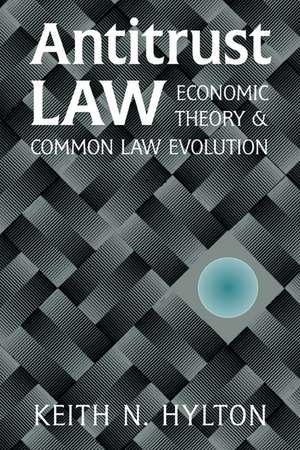Antitrust Law: Economic Theory and Common Law Evolution
Autor Keith N. Hyltonen Limba Engleză Paperback – 26 mar 2003
| Toate formatele și edițiile | Preț | Express |
|---|---|---|
| Paperback (1) | 406.71 lei 6-8 săpt. | |
| Cambridge University Press – 26 mar 2003 | 406.71 lei 6-8 săpt. | |
| Hardback (1) | 560.66 lei 6-8 săpt. | |
| Cambridge University Press – 26 mar 2003 | 560.66 lei 6-8 săpt. |
Preț: 406.71 lei
Nou
Puncte Express: 610
Preț estimativ în valută:
77.83€ • 84.52$ • 65.38£
77.83€ • 84.52$ • 65.38£
Carte tipărită la comandă
Livrare economică 23 aprilie-07 mai
Preluare comenzi: 021 569.72.76
Specificații
ISBN-13: 9780521793780
ISBN-10: 0521793785
Pagini: 432
Ilustrații: 14 b/w illus.
Dimensiuni: 163 x 225 x 22 mm
Greutate: 0.59 kg
Editura: Cambridge University Press
Colecția Cambridge University Press
Locul publicării:New York, United States
ISBN-10: 0521793785
Pagini: 432
Ilustrații: 14 b/w illus.
Dimensiuni: 163 x 225 x 22 mm
Greutate: 0.59 kg
Editura: Cambridge University Press
Colecția Cambridge University Press
Locul publicării:New York, United States
Cuprins
Part I. Economics: 1. Definitions; 2. Perfect competition versus monopoly; 3. Further topics; Part II. Law and Policy: 4. Some interpretations issues; 5. Enacting the antitrust law; 6. What should antitrust law aim to do?; Part III. Enforcement: 7. Optimal enforcement theory; 8. Enforcement provision of the antitrust laws; Appendix; Part IV. Cartels: 9. Cartels; 10. Conscious parallelism; 11. Conclusion; Part V. Development of Section 1 Doctrine: 12. The Sherman act versus the common law; 13. Rule of reason and per se rule; 14. Conclusion; Part VI. Rule of Reason and Per Se Rule: 14. The case for price-fixing; 15. Per se and rule of reason analysis: further developments; 16. Per se versus rule of reason tests: understanding the Supreme Court's justification for the per se rule; Part VII. Agreement: 17. The development of inference doctrine; 18. Rejection of unilateral contract theory; Part VIII. Facilitating Mechanisms: 19. Data dissemination cases; 20. Basing point pricing and related practices; 21. Basing point pricing: economics; Part IV. Boycotts: 22. Pre-Socony; 23. Post-Socony; 24. Post-BMI/Sylvania; 25. Conclusion; Part X. Monopolization: 26. Development of section 2 doctrine; 27. Leveraging and essential facility cases; 28. Predatory pricing; 29. Conclusion; Part XI. Power: 30. Measuring market power; 31. Determinants of market power; 32. Substitutability and the relevant market: cellophane; 33. Multi-market monopoly and the relevant market: Alcoa; 34. Measuring power: guidelines; Part XII. Attempts: 35. The Swift formula and modern doctrine; 36. Dangerous probability requirement; Part XIII. Vertical Restraints: 37. Resale price maintenance; 38. Vertical non-price restraints; 39. Manufacturer retains title; 40. Agreement; Part XIV. Tying and Exclusive Dealing: 41. Introduction; 42. Early cases; 43. Development of the per se rule; 44. Tension between rule of reason arguments and per se rule; 45. Technological tying; 46. Exclusive dealing; Appendix; 47. Horizontal Mergers: 48. Reasons for merging and implications for law; 49. Horizontal merger law; 50. Conclusion; Appendix; Part XV. Mergers, Vertical and Conglomerate: 51. Vertical mergers; 52. Conglomerate mergers; 53. Concluding remarks; Part XVI. Antitrust and the state: 54. Noerr-Pennington doctrine; 55. Parker doctrine.
Recenzii
'… this book is, quite simply, the best I have ever encountered to deal with US law. It is, in a nutshell, superb, and I wish it had been published six months ago.' European Competition Law Review
'This book is the single best one-volume discussion of modern antitrust law available. It is encyclopaedic in coverage, but deeper than a treatise because it is informed at every step with the best and most systematic of current economic and legal analysis. If you want to learn (or to learn more) about modern antitrust law, read this book.' George Priest, Yale Law School
'An excellent treatment of antitrust law. It should appeal to audiences in economics as well as law. The economic analysis will enable lawyers to understand and address all of the policy options, and to be able to analyze antitrust issues more completely and more persuasively. Keith Hylton is a well-known and respected scholar in this field.' Joel P. Trachtman, Fletcher School of Law and Diplomacy, Tufts University
'Hylton's text provides an excellent account of antitrust and common law evolution. He extracts the essence of the landmark antitrust decisions to demonstrate their legal evolution in a very efficient way. His use of economics is not only appropriate to the subject matter; it is also appropriate for student readership in law and economics. The writing is clear and concise.' Roger D. Blair, University of Florida
'This book is the single best one-volume discussion of modern antitrust law available. It is encyclopaedic in coverage, but deeper than a treatise because it is informed at every step with the best and most systematic of current economic and legal analysis. If you want to learn (or to learn more) about modern antitrust law, read this book.' George Priest, Yale Law School
'An excellent treatment of antitrust law. It should appeal to audiences in economics as well as law. The economic analysis will enable lawyers to understand and address all of the policy options, and to be able to analyze antitrust issues more completely and more persuasively. Keith Hylton is a well-known and respected scholar in this field.' Joel P. Trachtman, Fletcher School of Law and Diplomacy, Tufts University
'Hylton's text provides an excellent account of antitrust and common law evolution. He extracts the essence of the landmark antitrust decisions to demonstrate their legal evolution in a very efficient way. His use of economics is not only appropriate to the subject matter; it is also appropriate for student readership in law and economics. The writing is clear and concise.' Roger D. Blair, University of Florida
Notă biografică
Descriere
This book is an effort to consolidate several different perspectives on antitrust law.












